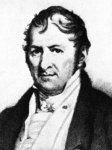
Worksheets and No Prep Teaching Resources
Inventors and Inventions
 Worksheets and No Prep Teaching Resources Inventors and Inventions |
Eli Whitney |
| edHelper's suggested reading level: | grades 4 to 6 | |
| Flesch-Kincaid grade level: | 7 |
| Print Eli Whitney (font options, pick words for additional puzzles, and more) |
| Quickly Print: PDF (2 columns per page) |
|
| Quickly Print: PDF (full page) |
| Quickly Print: HTML |
| Print a proofreading activity |
| Leave your feedback on Eli Whitney (use this link if you found an error in the story) |
|
Eli Whitney
By Mary L. Bushong |

|
 1 Have you ever wanted to invent something? When Eli Whitney was a young man, he found that he was good at inventing. Eli Whitney was born on December 8, 1765, in Westborough, Massachusetts. His father was a well-to-do farmer who also served as a justice of the peace. When Eli was 24, he began attending Yale College. He was expected to become a lawyer. But when he graduated in 1792, he was short on money. He decided to work for a while as a tutor, teaching young men skills they needed for college.
1 Have you ever wanted to invent something? When Eli Whitney was a young man, he found that he was good at inventing. Eli Whitney was born on December 8, 1765, in Westborough, Massachusetts. His father was a well-to-do farmer who also served as a justice of the peace. When Eli was 24, he began attending Yale College. He was expected to become a lawyer. But when he graduated in 1792, he was short on money. He decided to work for a while as a tutor, teaching young men skills they needed for college. |
Create Weekly Reading Books
Prepare for an entire week at once! |
 |
Inventors and Inventions
|
 |
Social Studies
|
|
Back to School Graphic Organizers Alphabet Worksheets Sight Words Math Worksheets Mazes 50 States Education Teaching Monthly Themes January February March April May June July August September October November December |
Fractions Place Value Time and Calendar Money Earth Day Solar System Analogies Nouns Following Directions Listening Capitalization Cursive Writing Patterns and Sequencing Dinosaurs All About Me Kindergarten First Grade Second Grade Third Grade Fourth Grade Fifth Grade Sixth Grade |
Multiplication Division Main Idea Cause and Effect Measurement Decimals Rounding Order of Operations Verbs Community Helpers Adjectives Plants Grammar Addition and Subtraction Contractions Bulletin Board Ideas Word Searches Crossword Puzzles Printable Puzzles Reading Comprehension Reading Skills English Language Arts |